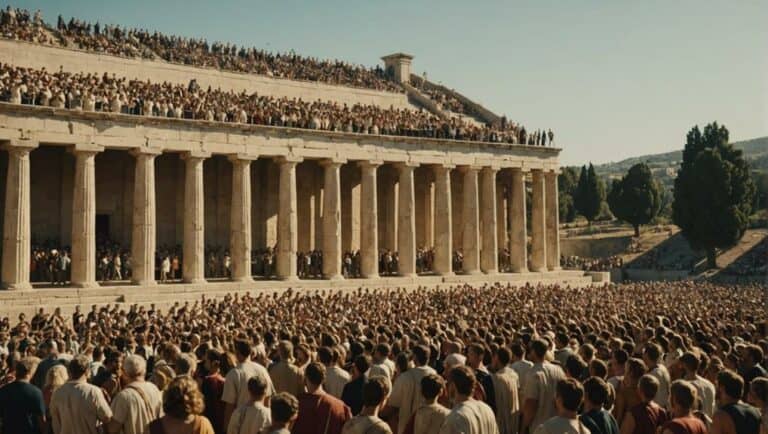The ancient Olympics were more than mere games; they honored Zeus and symbolized divine order in the sacred valley of Olympia.
From thrilling chariot races to rigorous pentathlons, these events encapsulated the Greeks' pursuit of physical prowess and spiritual devotion, offering a captivating glimpse into their culture and beliefs.
Origins and Mythology
The origins of the ancient Olympics are deeply rooted in Greek mythology, where they were established to honor Zeus's triumph over Cronus. According to legend, the games were a tribute to Zeus's victory, symbolizing the divine order he brought to the cosmos. This mythological framework imbued the Olympics with a profound sense of tradition and sanctity, firmly anchoring the event in the cultural and religious fabric of ancient Greece.
By understanding the mythology, you can see how the Olympics transcended mere entertainment. They weren't just a series of athletic contests but a grand pagan spectacle with significant religious undertones. The myths surrounding their origins added layers of meaning, making the games a celebration of divine favor and human excellence. In the context of Greek society, the games were more than just physical competitions; they were acts of devotion, reinforcing the communal reverence for Zeus.
This blend of mythology and tradition ensured the Olympics were seen as sacred. The religious aspect provided a moral framework, while the entertainment value attracted people from across the Greek world. Therefore, the Olympics served dual purposes, merging the sanctity of religious rituals with the excitement of competitive sports.
Olympia's Sacred Setting
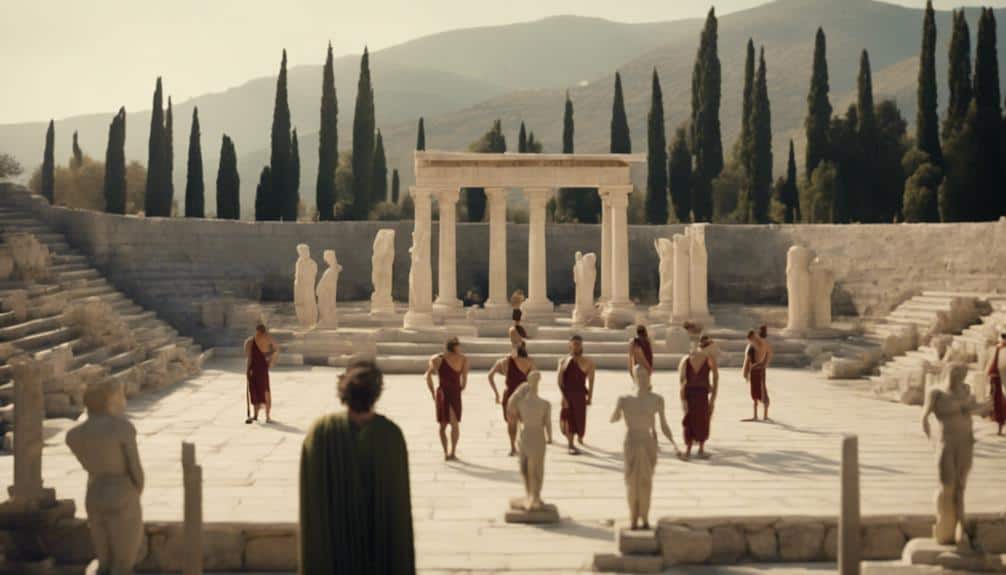
You can't overlook Olympia's lush river valley, which provided a fertile backdrop for the ancient games.
This region, renowned for its horse-breeding and chariot-racing, played a pivotal role in elevating the status of the Olympics.
The landscape itself, rich with pine trees and olive groves, underscored the sacred and prosperous nature of Olympia, enhancing its significance as a religious and athletic hub.
Fertile River Valley
Nestled in a lush, fertile river valley near the Balkan Peninsula, Olympia's sacred setting was instrumental in shaping the region's rich traditions and the eventual rise of the ancient Olympic Games. The area's geographical location in the region of Elis provided a strategic advantage, fostering diverse agricultural practices and contributing to its prosperity. The fertile valley, nourished by the Alpheus River, supported extensive olive groves and pine trees, creating an environment ripe for growth and development.
Elis was particularly renowned for its horse-breeding and chariot-racing traditions, which became integral parts of the Olympic Games. The natural resources available in this fertile river valley allowed for the cultivation of strong horses and the establishment of competitive events. Olympia's beginnings as a sacred grove further underscored its spiritual significance, drawing people from afar to its pine and olive-filled landscapes.
This unique combination of geographical location, rich natural resources, and cultural traditions made Olympia the ideal setting for the ancient Olympic Games. The fertility of the land not only supported the local population but also facilitated the growth of a sporting tradition that would echo through history, underlining the significance of this sacred setting.
Horse-Breeding Legacy
Olympia's status as a renowned center for horse-breeding heavily influenced its role in the ancient Olympic Games, highlighting the area's exceptional equestrian traditions and natural resources. Located near Elis, known for its prestigious horse-breeding, Olympia benefited economically and culturally from this legacy.
The lush setting, with its fertile lands and natural beauty, provided ideal conditions for horse-racing and chariot events, making the competitions both prestigious and competitive.
You can break down the influence of horse-breeding on Olympia into three key points:
- Economic Prosperity: The fertile valley near Elis sustained the economy by supporting extensive horse-breeding, which in turn funded the games and local infrastructure.
- Prestigious Equestrian Events: The legacy of excellence in horse-breeding made Olympia's equestrian events highly competitive, attracting participants from across Greece.
- Sacred and Natural Setting: Olympia's pine trees, olive groves, and remote location added to its allure, emphasizing the intersection of natural beauty and sporting excellence.
Early Olympic Events
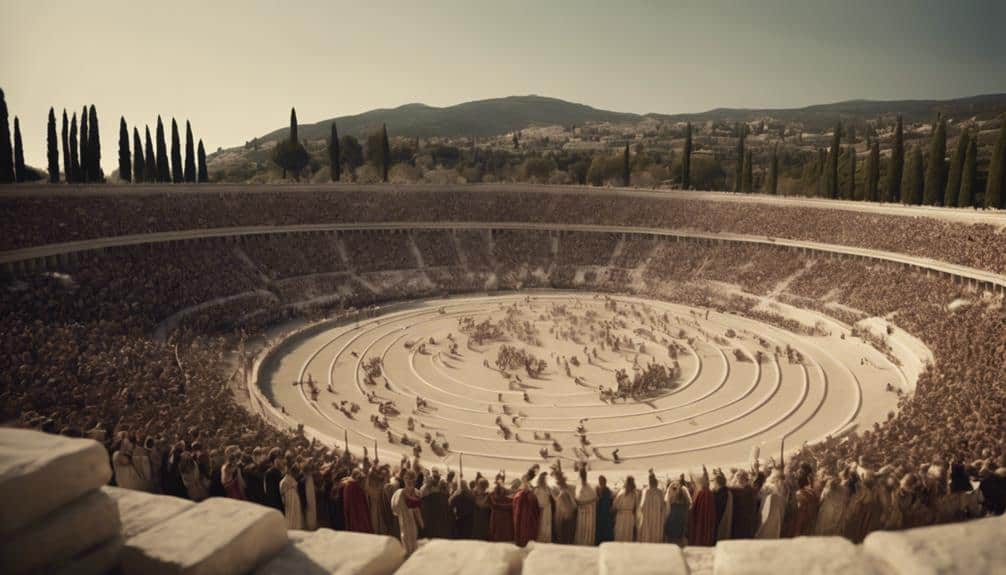
You'll find that early Olympic events were a mix of athletic prowess and competitive spirit, with the pentathlon showcasing skills in running, jumping, and discus.
Popular running events, such as the stade race and diaulos, highlighted speed and endurance.
Equestrian events, including chariot and horse races, added prestige and spectacle, demonstrating the importance of both human and animal agility in these ancient games.
Chariot Racing and Equestrian Events
Chariot racing, a highly popular event at the ancient Olympics, captivated audiences with its intense competition and dramatic displays, as evidenced by its frequent depiction on Greek vases and the prestigious cauldron prizes awarded to victors. These cauldron prizes weren't just symbols of victory; they held significant ritual importance. Winners like Nestor often used them in sacrificial rituals, underlining the event's deep cultural resonance.
The equestrian events at the ancient Olympics weren't limited to chariot racing. Held in the prestigious Hippodrome, these events also included horse races, showcasing the exceptional horse breeding of the Elis region. The lush, fertile environment of Elis contributed to its reputation, making it a hub for breeding top-tier horses, essential for these competitive sports.
Consider the following:
- Greek Vases: These artifacts often depicted the thrilling moments of chariot and horse races, immortalizing the events.
- Cauldron Prizes: Victors received these not just as trophies but as significant religious artifacts.
- Hippodrome: This venue was central to equestrian events, symbolizing the grandeur of ancient Olympic competitions.
Understanding these aspects highlights how deeply interwoven chariot racing and equestrian events were with ancient Greek culture and religion.
Pentathlon and Running Events
The pentathlon, introduced in 708 B.C., epitomized the Greek ideal of a well-rounded athlete by combining running, jumping, and discus throwing into a single, multifaceted competition. This event showcased diverse athletic skills, highlighting the versatility required in the ancient Olympics.
Running events were integral to the pentathlon, with the stade race covering 200 meters, the diaulos spanning 400 meters, and the dolichos, a long-distance race ranging from 7 to 24 stades. These events tested speed, endurance, and strategy.
In jumping events, athletes used halteres, weights that they held during their jump to increase their distance. After leaping, they jettisoned these weights backward, utilizing momentum to enhance their performance.
The discus throw, another key component, involved athletes hurling stone, iron, lead, or bronze discs. The technique for this event was remarkably similar to modern freestyle throws, requiring both strength and precision.
Chariot Racing and Horse-Racing
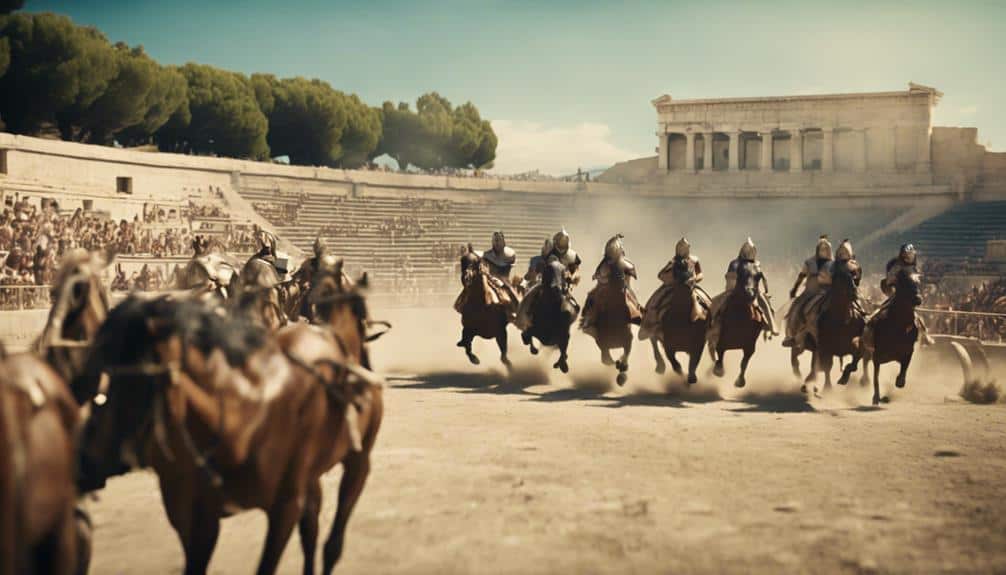
Equestrian sports captivated ancient Greek audiences, with chariot racing and horse-racing standing out as premier events that showcased both athletic prowess and cultural significance. The Greeks' fascination with these sports is evident through the detailed scenes of chariot racing depicted on Greek vases. These events didn't just entertain; they held deep cultural and ritual importance.
Chariot Racing: This sport was more than a test of speed and skill. It symbolized prestige and was linked to historical figures like Nestor and Odysseus, who used their cauldron prizes in sacrificial rituals, emphasizing the religious element of the competition.
Horse-Racing: Olympia's fertile valley made it a hub for horse-breeding, drawing skilled riders and swift horses to the races. The region's dedication to equestrian excellence ensured these events were highly competitive and celebrated.
Cultural Significance: Winning chariot races held immense prestige, often depicted in Greek art and literature, reflecting the high esteem for these events in ancient Greek society.
Pentathlon and Combat Sports
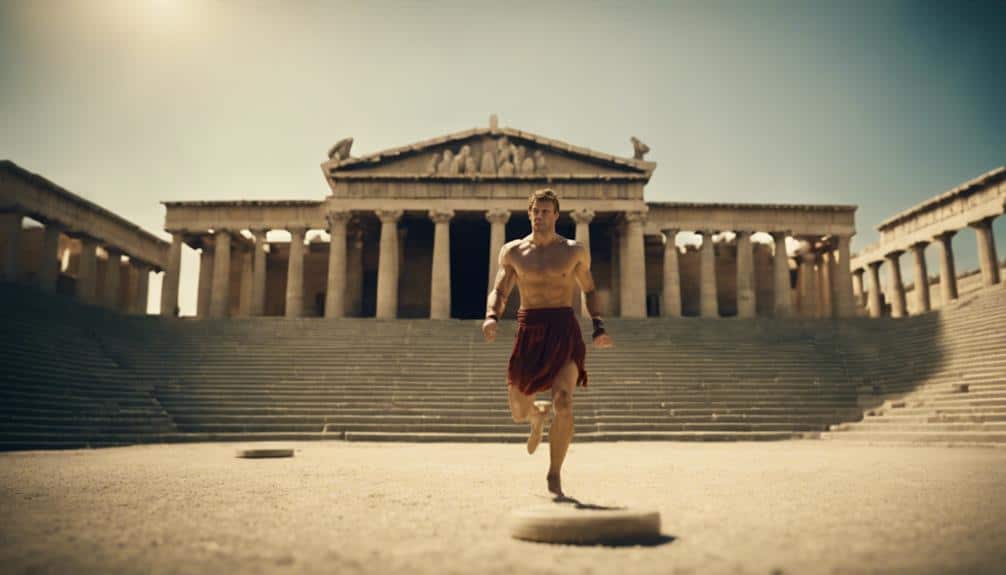
Pentathlon and combat sports at the Ancient Olympics highlighted the Greeks' pursuit of physical excellence and strategic prowess. The Pentathlon, introduced in 708 B.C., was a multifaceted event combining running, jumping, discus throw, javelin throw, and wrestling. Each component tested different attributes, from speed and agility in running and jumping to precision and strength in the discus and javelin throws.
Wrestling, integral to the Pentathlon, was greatly valued as a military exercise, concluding only when one competitor admitted defeat. Combat sports, including wrestling, boxing, and pankration, were central to the Games. Boxing evolved significantly, with athletes initially using soft leather straps called himantes to protect their wrists. Over time, these evolved into harder leather, increasing the sport's brutality.
Pankration, a blend of wrestling and boxing, was considered one of the toughest events. It involved minimal rules and maximum physical engagement, representing the ultimate test of endurance and fighting skill. Through these events, the Ancient Olympics showcased not just physical might but also the strategic thinking essential for success.
These competitions set a high bar for athletic achievement, mirroring the Greeks' broader cultural values of excellence and honor.
Equestrian Competitions
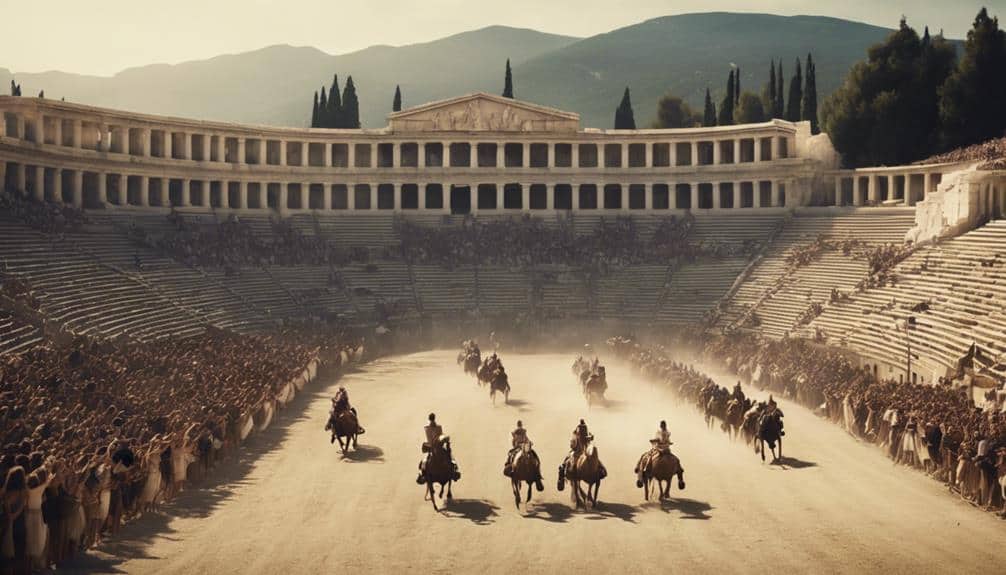
Moving from the intense physical confrontations of combat sports, you'll find equestrian competitions at the Ancient Olympics equally enthralling, showcasing the elite status and skill of both horse and charioteer. Held in the prestigious Hippodrome at Olympia, these events were a true indication of the grandeur and exclusivity of the ancient games.
Equestrian events weren't just about speed but also about the intricate bond between the horse and its charioteer. The chariot races, a centerpiece of these competitions, required incredibly skilled charioteers who could maneuver the horses with precision and agility. The location of Olympia, nestled in a fertile valley, was ideal for such events and benefited from the region's renowned horse-breeding practices.
The appeal of these competitions can be broken down into three key points:
- Prestige: The cost of maintaining horses made participation in these events exclusive.
- Skill: Chariot races demanded expertise, making them exciting for spectators.
- Venue: The Hippodrome provided a grand stage for showcasing athletic prowess.
Equestrian competitions at Olympia were more than just races; they were a celebration of elite athleticism and aristocratic prestige, captivating both participants and spectators alike.
Cultural and Religious Significance
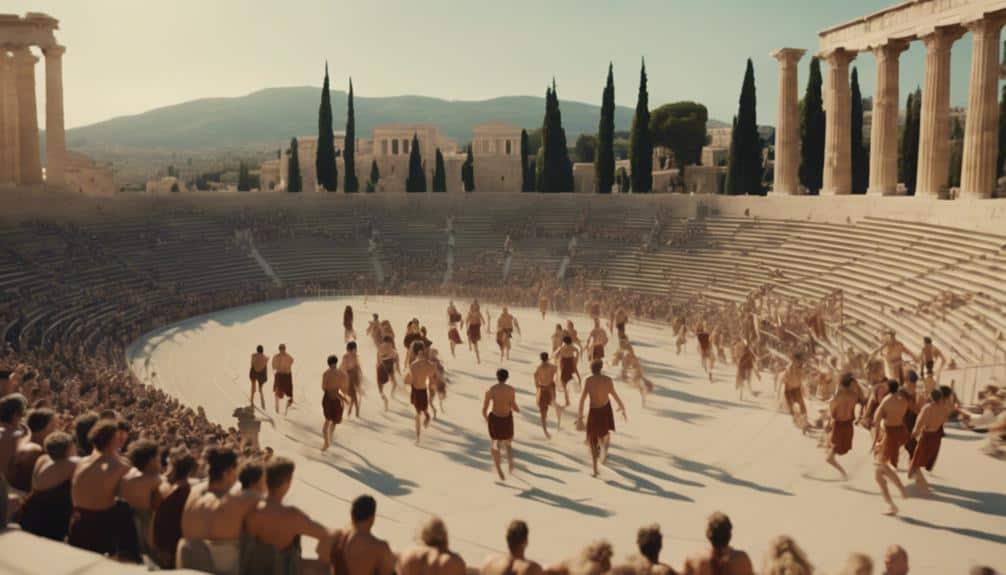
The ancient Olympics weren't just athletic contests; they were a profound expression of Greek cultural and religious devotion, centered around honoring Zeus. Olympia, the sacred site of the games, wasn't merely a sports venue; it was a worship center steeped in spiritual significance. Athletes and spectators alike arrived not only for competition but to immerse themselves in a spiritual atmosphere, participating in rituals that honored Zeus, the king of the Greek gods.
The religious significance of the ancient Olympics elevated the event beyond mere athletics. The games combined physical prowess with deep spiritual importance, drawing participants from across the Greek world to Olympia. This convergence created a unique blend of religious fervor and athletic excellence, underscoring the cultural importance of the event.
Artistic expression also played a pivotal role. Poets, sculptors, and painters found inspiration in the games, capturing the essence of Greek culture and the reverence for the gods. Their works contributed to the overall cultural significance of the Olympics, transforming Olympia into a hub of artistic and spiritual activity.
Therefore, the ancient Olympics weren't just about sport; they were a celebration of Greek identity and religious devotion.
Evolution and Decline
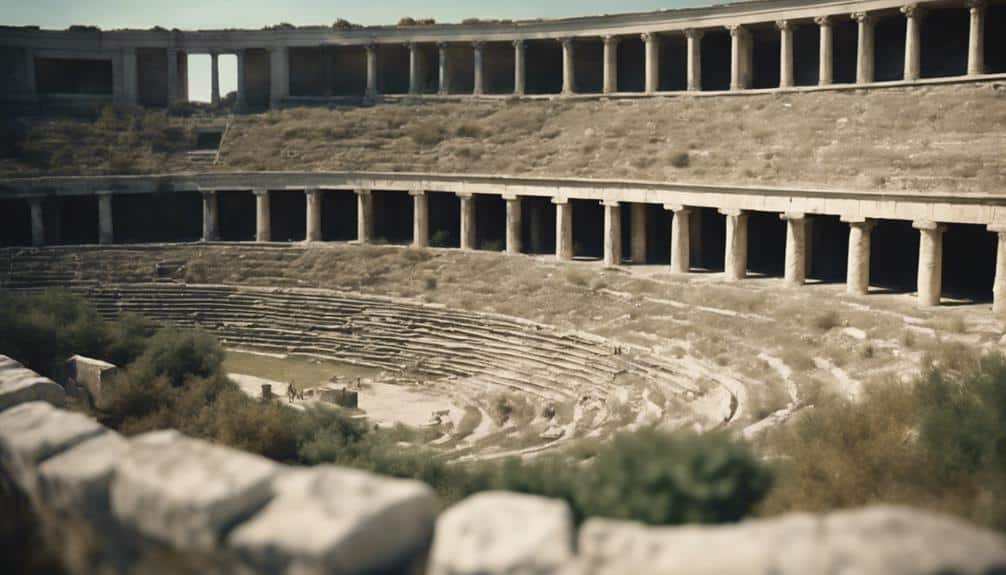
As the Roman Empire expanded its influence, the ancient Olympics began to wane, with rulers like Nero manipulating the games for their own gain. The Roman conquest fundamentally changed the cultural landscape, leading to a decline in the popularity and integrity of the event.
Nero's infamous participation in the games, where he declared himself the victor, highlighted the corruption creeping into this revered institution.
Several factors accelerated the decline:
- Natural Disasters: Earthquakes and other calamities in the 3rd century notably damaged Olympia, the heart of the games.
- Invasions: Repeated invasions disrupted the social and economic stability necessary to sustain the games.
- Theodosius I: In AD 393, Theodosius I held the last recorded ancient Olympic Games, officially marking their end.
Despite this, archaeological evidence indicates that some form of the games persisted beyond this official date. The legacy of the ancient Olympics endured, ultimately inspiring the modern Olympics, which emphasize peace, unity, and physical excellence.
The revival of the Olympics in the modern era honors this ancient tradition, transforming it into a global celebration of athletic prowess and international cooperation.
Understanding the evolution and decline of the ancient Olympics provides context for appreciating their profound impact on today's world.


